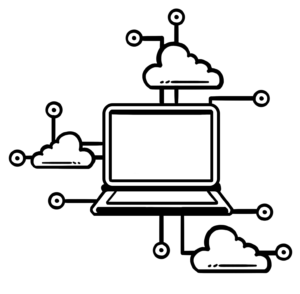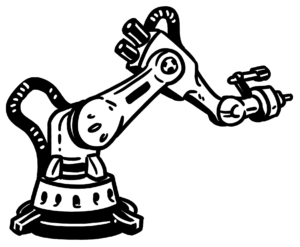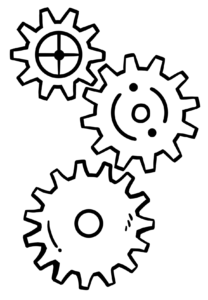Digitalization is on a quest. Today, large areas in the living and working environments are covered by digitalization – and this trend is constantly accelerating. Developments within communication technology and digitalization initiate new possibilities for the industry, especially for businesses. Fully networked production processes and resources offer the unexpected potential to optimize value chains. Additionally, within companies’ leadership, culture and workflows, changes are
being initiated. In order for you not to lose the big picture perspective, we have outlined the topic systematically over the following pages. Let’s get started!In addition to the press and public, larger institutions such as the Federal Ministry of Labour and Social Affairs and the Frauenhofer Institute explore industry 4.0. They predict far-reaching changes for our working and living environments – starting today.
What does this mean for you and your business?
To effectively use all the advantages of industry 4.0, it is necessary to go beyond mere tech modifications. New digital processes and a focus on networking require a new operating system and a corporate culture 4.0. Ergo, its development is essentially tied to change management – and requires a courageous management 4.0 upgrade that enhances cultural change and creates the necessary freedom for staff.


To make use of the various possibilities of industrial change, employees 4.0 must operate outside of their work range. The future predicts a stronger cooperative form of teamwork. Therefore, adjusted professional development around industry 4.0, aims to enable employees to develop a vivid communication culture. New study formats are introduced that are tailored to the staff’s environmental conditions, vision needs, and learner types. Establishing and promoting new forms of corporate learning are enhanced through interactive formats as well as explainer videos. The objective: efficient, individually designed and flexible learning in alignment with knowledge management 4.0.
In times of change and new work forms, employees 4.0 raise news demands that include: flexible working hours, professional development, promotion prospects, and a work-life balance.
Exploring the origin of industry 4.0.

‘Industry 4.0’ is known as the fourth industrial revolution and refers to the change in the current labor market. Developments within communication technology and digitalization initiate new possibilities that have implications for humanity.
The first revolution refers to mechanization. The first machines were used and the human-machine interaction made its debut: a massive change for the working and living conditions of humans. The second industrial revolution followed swiftly and was triggered by harnessing electricity. It enabled mass production and paved the way for the third industrial revolution, characterized by automation through electrical engineering and IT. It is also referred to as the ‘digital revolution’ or micro electric revolution’ as it is shaped by the use of computers.

The essential component for the fourth industrial revolution is networking. Previously analog-functioning systems are now digital and able to link to one another. Transferring information is facilitated and just-in-time production, as well as time-space independent working, is enabled. The preconditions to optimize the entire value-added chain are met by linking the sub-areas and resources (human, machine, facilities).
New opportunities are created, especially for medium-sized businesses. Companies are rewarded with increased efficiency, positive working environments and improved recruitment of a qualified workforce.
Can we support your journey towards business 4.0 with explainer videos? Contact us and we will happily advise you!
